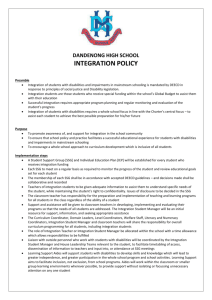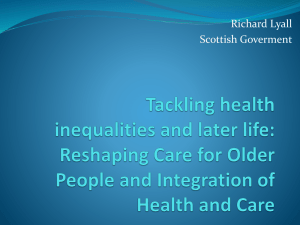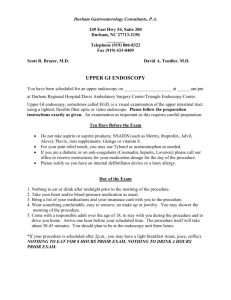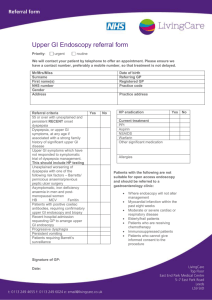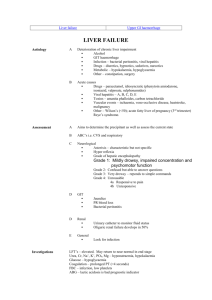22nd January 2010 - Scottish Society of Gastroenterology
advertisement
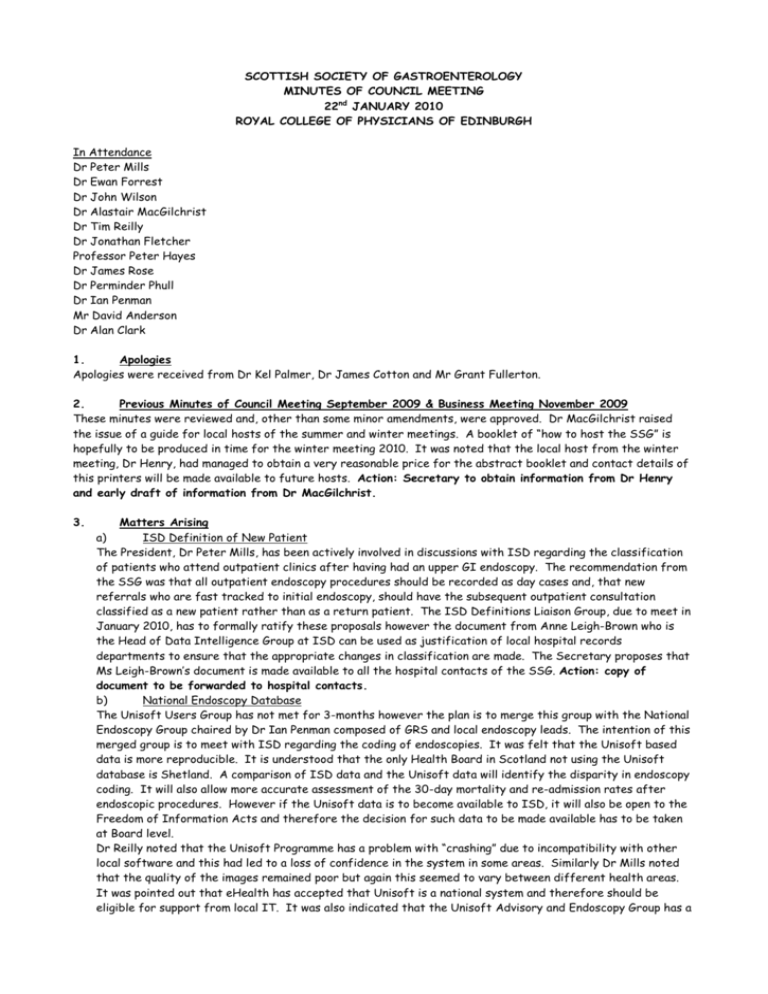
SCOTTISH SOCIETY OF GASTROENTEROLOGY MINUTES OF COUNCIL MEETING 22nd JANUARY 2010 ROYAL COLLEGE OF PHYSICIANS OF EDINBURGH In Attendance Dr Peter Mills Dr Ewan Forrest Dr John Wilson Dr Alastair MacGilchrist Dr Tim Reilly Dr Jonathan Fletcher Professor Peter Hayes Dr James Rose Dr Perminder Phull Dr Ian Penman Mr David Anderson Dr Alan Clark 1. Apologies Apologies were received from Dr Kel Palmer, Dr James Cotton and Mr Grant Fullerton. 2. Previous Minutes of Council Meeting September 2009 & Business Meeting November 2009 These minutes were reviewed and, other than some minor amendments, were approved. Dr MacGilchrist raised the issue of a guide for local hosts of the summer and winter meetings. A booklet of “how to host the SSG” is hopefully to be produced in time for the winter meeting 2010. It was noted that the local host from the winter meeting, Dr Henry, had managed to obtain a very reasonable price for the abstract booklet and contact details of this printers will be made available to future hosts. Action: Secretary to obtain information from Dr Henry and early draft of information from Dr MacGilchrist. 3. Matters Arising a) ISD Definition of New Patient The President, Dr Peter Mills, has been actively involved in discussions with ISD regarding the classification of patients who attend outpatient clinics after having had an upper GI endoscopy. The recommendation from the SSG was that all outpatient endoscopy procedures should be recorded as day cases and, that new referrals who are fast tracked to initial endoscopy, should have the subsequent outpatient consultation classified as a new patient rather than as a return patient. The ISD Definitions Liaison Group, due to meet in January 2010, has to formally ratify these proposals however the document from Anne Leigh-Brown who is the Head of Data Intelligence Group at ISD can be used as justification of local hospital records departments to ensure that the appropriate changes in classification are made. The Secretary proposes that Ms Leigh-Brown’s document is made available to all the hospital contacts of the SSG. Action: copy of document to be forwarded to hospital contacts. b) National Endoscopy Database The Unisoft Users Group has not met for 3-months however the plan is to merge this group with the National Endoscopy Group chaired by Dr Ian Penman composed of GRS and local endoscopy leads. The intention of this merged group is to meet with ISD regarding the coding of endoscopies. It was felt that the Unisoft based data is more reproducible. It is understood that the only Health Board in Scotland not using the Unisoft database is Shetland. A comparison of ISD data and the Unisoft data will identify the disparity in endoscopy coding. It will also allow more accurate assessment of the 30-day mortality and re-admission rates after endoscopic procedures. However if the Unisoft data is to become available to ISD, it will also be open to the Freedom of Information Acts and therefore the decision for such data to be made available has to be taken at Board level. Dr Reilly noted that the Unisoft Programme has a problem with “crashing” due to incompatibility with other local software and this had led to a loss of confidence in the system in some areas. Similarly Dr Mills noted that the quality of the images remained poor but again this seemed to vary between different health areas. It was pointed out that eHealth has accepted that Unisoft is a national system and therefore should be eligible for support from local IT. It was also indicated that the Unisoft Advisory and Endoscopy Group has a remit to try and improve the database and, that locally the GRS lead (or delegated individual) can be contacted regarding suggestions for the database. Mr Anderson noted that in many areas there was a lack of Unisoft facilities in emergency theatre which leads to a loss of recording of activity as well as meaning that clinically important endoscopic procedures are not being recorded. c) Alcohol Bill The deadline for written evidence to the Scottish Parliament was the 20th January. The SSG didn’t make any specific submission but Dr MacGilchrist, through the Royal College of Physicians in Edinburgh, has been involved in the drafting of a comprehensive document which has been submitted giving medical support for the bills proposals. Many members of the Society, including council members, had submitted the letter to their area MSP’s and were able to engage in discussion with politicians from all parties on this subject. There is a sense that there is hopefully a ground swell of political opinion moving towards the bills proposals. It was noted in particular that English politicians appeared to be more in favour of the proposals, as opposed to the Scottish Labour and Liberal Democrat Parties who have currently expressed their residence to these measures. 4. Consultant Workload Dr Allan Clark gave a comprehensive presentation of trends in consultant workload. This presentation will be attached to these minutes for further consideration. The subsequent discussion focused upon the validity of the data presented, how exactly to use the data which we have and lastly, how to link this data with manpower planning. It was noted that there were significant gaps in the data but ISD has not indicated any current intention to fill these gaps. There were some remarkable disparities regarding the number of returns and inpatient episodes. There was also discussion as to whether this data should be published. It was felt that the data should be reviewed by council members in the first instance, and that perhaps Dr Clark should present the data to the summer meeting of the SSG. Dr Stewart Campbell will be approached regarding integrating this presentation into the meeting. The feeling was that the purpose of publication would be to identify that the data itself was flawed and therefore there needed to be an improved method of collecting consistent data throughout Scotland. It was also felt that although some of the individual data may be inaccurate, overall trends were apparent and that these could be used to identify areas of significant under resource. In any publication it was felt that it would be reasonable to give some indication (or flag) the degree of confidence the council had in the statistics presented. Dr Wilson suggested that it might be possible to offer half a salary to ISD for one year for someone to be specifically employed to obtain details of individual gastroenterologist’s job plans with relevance to their endoscopy and clinic commitments, and to ensure that the data collection for each Health Board was robust. It was felt that the best way of addressing the flawed data was to work with ISD rather than in opposition to ISD. It was also recognised that the consultant data had to be updated as there had been a series of recent new appointments. Action: Dr Clark’s presentation to be distributed to Council members for further consideration. Secretary to contact Dr Campbell about including a presentation on this subject at the summer meeting. 5. National Liver Plan The national liver plan has been published with the recent appointment of a national liver “czar” Dr Martin Lombard. The document presented to the council has shown a dramatic increase in liver related mortality in the United Kingdom, however only 10% of gastroenterologists describe themselves as hepatologists and there are only 16 hepatology training slots in the United Kingdom. The impression however was that the “national liver plan” had very much an Anglo centric focus and that it had to be put more clearly into a Scottish context. The plan has approval by the Department of Health and therefore the Scottish government has to respond to it. The main proposals were that each hospital should have a clinical lead in hepatology. This should be a managed clinical network in hepatology. There should be assessment of access to any local intensive care facilities and the relatively low transplant rate should be addressed. In addition, it was felt that other areas of concern were access to alcohol support services and adequate pathology and radiology support services for hepatology. It was acknowledged that the Scottish government are already putting a significant investment into chronic hepatitis C and alcohol services. However further meetings with Aileen Keel the Deputy CMO, should continue. There have already been approaches to the Deputy CMO by Professor Hayes and Dr MacGilchrist. Dr Rose indicated that there should be minimum standards of care for liver patients in Scotland. The Secretary proposed that hospital contacts be asked to answer a short questionnaire regarding liver facilities in their institution in order to inform the discussion with the deputy CMO. It was also proposed that Dr Martin Lombard be asked to speak at the SSG and perhaps this might be best planned for the winter meeting being hosted by Dr Andrew Bathgate. Action: Proposed Liver services questionnaire to be circulated to Council. Dr Bathgate to be approached to allow Dr Lombard to speak at the Winter meeting. 6. Scottish Inflammatory Bowel Disease Interest Group Presented to the council were the minutes of the Scottish Inflammatory Bowel Disease Interest Group from the 30th September as well as a list of membership. It was acknowledged that Dr Gaya has been very active in establishing this interest group with a view to creating an effective MCN. The SSG remains very supportive of this development. 7. SSG Website The SSG website remains “live” although not currently up to date or effectively populated with relevant news. The SSG still has an account with TAQT.co.uk (formally ChequeBase). TAQT have agreed to add relevant documents to the website. For the website to be effective however it has to be up to date for members to access relevant information relating to the speciality and to the society itself. The Secretary will identify specific members of the council to provide documents for publication. It was accepted that there would be some information which should be available to council members and perhaps ordinary members of the society only. This would involve the creation of a password system. This might include the minutes of the council meeting and any documents in draft form awaiting approval or comment. Action: Secretary to approach relevant Council members for contributions to website. 8. Future Meetings The next meeting is to be held on Friday, 4th June at Strathclyde Hilton Hotel hosted by Dr Stewart Campbell. Speakers include Dr David Hawkins talking about the interface between genitourinary medicine and gastroenterology, and also Albert Breadenoord who is an international expert in GI physiology. Dr Andrew Duncan (consultant biochemistry) has requested an opportunity to speak about a Wilson’s disease assay, and the meeting also has facilities for a breakout session for the GI physiologists. The GI physiology component of the meeting is to be co-ordinated by Dr Winter. The winter meeting is to be hosted by Dr Andrew Bathgate in Edinburgh. The date suggested currently is the 16th December. There was some discussion however that this was a Thursday which may not be particularly convenient for many members and there were concerns that the dinner may be poorly attended. It is recognised that the winter meeting will be a joint meeting will be a joint meeting with the hepato-pancreatobiliary MCM and, as previously noted, Dr Martin Lombard will be asked to present regarding the National Liver Plan. Action: Dr MacGilchrist will speak to Dr Bathgate further about the proposed date of the meeting. 9. Research Update Professor Hayes was able to confirm that the TOPIC study continues to be active. Recruitment has been less than anticipated but it is hoped that with expansion to other centres, that the study will be successful. There was a plan for a study of autoimmune pancreatitis to be carried out. Professor Hayes will contact Dr Church regarding this study. There was uncertainty about the progress of the childhood inflammatory bowel disease study organised by Professor Wilson. It was understood that the OASIS study did not receive adequate funding. The HTA funded STOPAH study in alcoholic hepatitis is due to start in the near future. This is awaiting CSP and subsequently NRS approval and support. As an eligible study, it should be able to access local R&D support for both research nurse and pharmacy costs. Professor Hayes noted that the NIHR CLRN research network was well established in England. In Scotland the liver representative is Professor Hayes and the luminal gastroenterology representative is Professor Jack Satsangi. Scotland is reasonably well represented in the database of studies largely on account of the PSC and PBC sampling study being co-ordinated by Drs Bathgate and McGilchrist in Edinburgh. However it was felt appropriate that the data regarding recruitment studies from Scotland should be available and may well be suitable for publication through the SSG website. 10. Gastroenterology Training There has been a dramatic reduction in trainees. It is thought that over the next 5-years there will probably be 5 posts throughout Scotland per year. This year there are 3 “closed” posts with 6 applicants, with interviews due to take place in the middle of February. It is felt there may be one or two “open” posts available later in the year. It was emphasised the importance of keeping lapped posts open to ensure that funding remains within the speciality. There have been some difficulties in providing adequate endoscopy training courses for our trainees in Scotland. One of the main difficulties is getting an adequate faculty to commit to these courses. Dr Morris at Glasgow Royal Infirmary has suggested that each trainer should commit to 2-3 courses per year to maintain an adequate standard. Information regarding courses is usually available through the JAG and JETS websites. Recently both Glasgow Royal Infirmary and Ninewells Hospital have been removed from the site as they did not have current JAG accreditation. This is currently being addressed and it is expected that both sites will feature again on the website in the near future. Dr Reilly noted that funding should be available for trainees to attend course as these are mandatory requirements. He also indicated that perhaps funding would be available to allow trainers to attend these courses. 11. BSG Matters Dr Phull presented a document on re-validation and was hoping for feedback relating to those aspects specific to gastroenterology. There was no specific deadline for such feedback but comments would be appreciated from council members. The re-validation document will be attached to these minutes for consideration. Action: Secretary to ask Hospital Contacts to provide basic information regarding the availability of out of hour’s endoscopy. There was some discussion regarding the role of the devolution group of the BSG. It was felt however this group had a rather indefinite role with no clear terms of reference. It was felt that further discussion was required regarding the presence of a Scottish representative on this group but no firm conclusion was come to. There was also some discussion regarding bowel cancer screening. It was noted that the level of support provided to the pilot project was not available for the National Screening Programme. In particular there was a significant lack of feedback to those colonoscopists involved in the programme. Dr Penman indicated that he would contact the screening programme directors on behalf of the SSG indicating the societies concerns. It was also highlighted that the deadline for BSG committee members was due on the 5 th February. Action: Secretary to e-mail SSG members to ensure that there is an adequate Scottish representation on these groups. 12. National Endoscopy Issues Dr Penman indicated that the combined JAG QIS visits were due to start initially in the Highlands and then the Grampian regions. There have been some difficulties in getting adequate numbers of assessors although it is felt that in the first instance that some assessors will come from England. The visits will take the form of “pre-JAG” visits however if the unit is found to have only a few minor inadequacies then the visit will be regarded as a full visit with the requirement for only a minor review thereafter. There has been some discussion the quality assurance of individual colonoscopists. The remit is for endoscopy units to be assured rather than individual colonoscopists. However some, including Professor Steele from Dundee, have emphasised the importance of an individual’s performance. In due course this may become the standard for assessment. There was some concern that for some endoscopy units in Scotland there may be a lack of “drivers for change” as there is probably not an effective sanction should a unit be found to be below standard. 13. Finances Dr Wilson was able to report that the society remains solvent. There was some discussion regarding what should happen to funds derived from the sponsorship from the local meetings. Historically the local organiser has solicited funding from pharmaceutical companies. If there was any excess then it was accepted that this money may be used by the local organiser for a departmental or research fund. However the SSG has always be in a position to provide funds to ensure a meeting is set up adequately ahead of funding from pharmaceutical sponsors and would always be in a position to cover any loss. However it was recognised that on some occasions there was a significant excess in sponsorship and the discussion was as to whether this excess should be given wholly or partly back to the SSG. If the SSG is to take on a more active role with more modern forms of information dissemination such as the website, then adequate funding will be required. Rather than increase the subscription, it was felt that perhaps some of the profit from a local meeting could be re-directed back into the SSG account. This was felt to be more appropriate if the SSG itself was active in helping to solicit this funding. Dr Wilson suggested this might be a role for the treasurer. A final conclusion was not reached however the trend of the discussion was that if the SSG was to be involved in obtaining sponsorship, it should at least benefit from a certain percentage of any excess funds. 14. Composition of Council There remains a vacancy for a trainee representative. Four trainees have expressed interest and abbreviated CV’s are awaited from them before asking filler trainees to indicate their support. Action: Dr MacGilchrist to provide a document indicating the dates that council members joined the council as re-election may be required. 15. AOCB There was some discussion regarding the prescription of oral bowel cleansing. Recent recommendations have suggested that this should not be prescribed without an up to date set of U&E’s and assessment by the prescriber. This of course would have a significant impact upon straight to test colonoscopy. As yet a universal solution has not been identified although one suggestion was that GP’s should be obliged to indicate the eGFR on the referral form for a patient with GI symptoms which may require colonoscopy. Experience form Ayr Hospital indicated that face to face pre-assessment of patients for colonoscopy did not help. The newsletter is now available for distribution however it was felt that in the future this should probably be done either through the website or by e-mailing members. 16. Date of Next Meeting As the council meeting had overrun this time, there wasn’t a full discussion regarding the next council meeting and opinions will be solicited from council members with the distribution of these minutes. Action: Council Members to decide date of next Council meeting.
